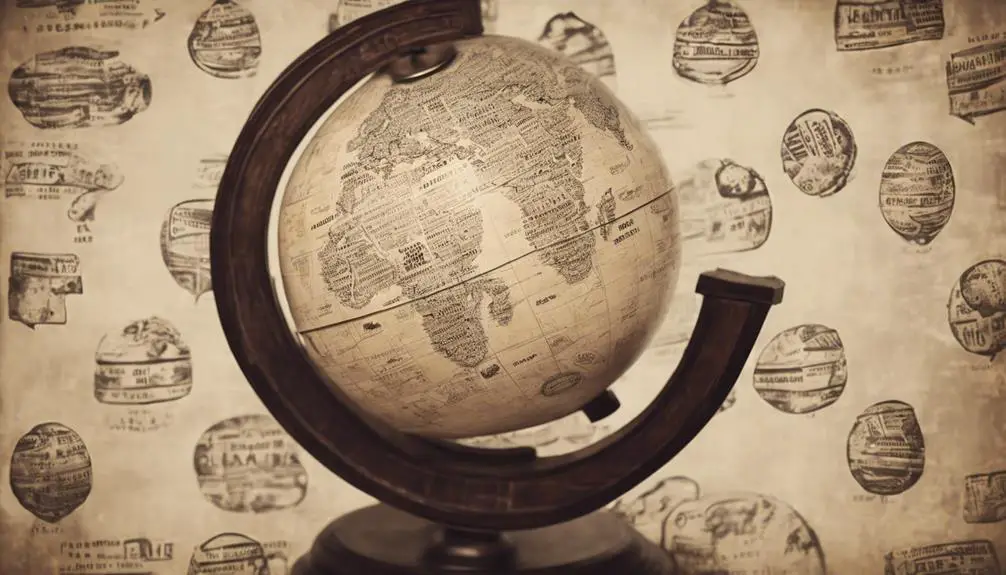The origin of the Martiniquan Creole language is a unique linguistic blend with roots entrenched deeply in the island's multifaceted history. It presents a compelling topic for discussion as the principal language of Martinique, bearing the indelible imprints of French colonial rule, African heritage, and the influences of Carib and other European languages.
Yet, its development and evolution over the years remain an intriguing area of research. Inviting further exploration, let us discuss the historical and cultural dynamics that have shaped this vibrant language.
Historical Context of Martinique

In order to fully comprehend the genesis of the Martiniquan Creole language, it is crucial to delve into the historical context of Martinique, an island marked by a rich and complex past.
The island's indigenous culture and colonial architecture, symbols of its layered history, provide a backdrop for understanding the emergence of Creole, a linguistic representation of the islanders' collective journey towards freedom.
French Influence on Creole

Undeniably, the French language has exerted a substantial influence on the development and evolution of Martiniquan Creole, shaping its lexicon, syntax, and phonetics profoundly.
French linguistic elements, markedly visible in the Creole vocabulary and Creole phonetics, are interwoven into the fabric of the language, demonstrating the depth of French impact.
This integration underscores linguistic freedom, while also highlighting the complex, multifaceted nature of Creole genesis.
African Contributions to the Language

The African imprint on the Martiniquan Creole language is heavily linked to the historical context of the transatlantic slave trade. This influence has embedded profound linguistic elements of African origin into the lexicon, syntax, and phonology of the Creole language.
A comprehensive analysis of these elements will illuminate the depth of African contributions and their enduring legacy in the Martiniquan Creole language.
Slave Trade Influence
Drawing upon diverse African linguistic roots, the slave trade profoundly shaped the development of Martiniquan Creole language.
The Creole Cuisine Influence, a fusion of African, European, and indigenous flavors, echoes in the language's diverse lexicon.
Religious Syncretism further diversified the Creole vocabulary, introducing African religious concepts.
The language evolved as a tool for communication, symbolizing the slaves' desire for freedom.
Linguistic African Elements
In examining the African contributions to Martiniquan Creole language, one cannot overlook the significant linguistic elements derived from various African languages.
Creole phonetics bear traces of African intonations and rhythmic patterns. Moreover, the language diversity found within Martiniquan Creole reflects the African linguistic richness, encapsulating various dialects and ethnic languages, which played a crucial role in shaping this unique linguistic blend.
Impacts of Carib and Other European Languages

Undeniably, the Carib language and various European languages have exerted profound influences on the evolution and character of Martiniquan Creole.
- The Carib culture impact is evident in the language's structure and vocabulary.
- The European linguistic fusion has introduced many loanwords.
- Additionally, the blending of these languages has created a unique linguistic identity, reflecting the island's diverse history and the spirit of freedom its people embody.
Evolution and Development of Martiniquan Creole

Reflecting upon the influences of both Carib and European languages, it becomes clear how the Martiniquan Creole has evolved and developed over time, embodying a rich tapestry of cultural interactions and historical events.
Its unique Creole syntax reflects a fusion of linguistic elements, while language standardization efforts testify to an ongoing struggle for linguistic freedom, shaping the multifaceted voice of Martinique's diverse inhabitants.
Modern Day Martiniquan Creole

Transitioning into the present day, Martiniquan Creole continues to evolve as a dynamic language, mirroring the shifting cultural and social landscapes of the island. Modern expressions of this language can be seen in:
- The burgeoning Creole literature scene
- Efforts towards language preservation
- Its influence on the local music and arts scene
These developments underline the language's vibrant role in the freedom and identity of the Martiniquan people.
Frequently Asked Questions
How Is the Martiniquan Creole Language Taught in Schools Today?
The Martiniquan Creole language is taught in schools today through Creole Curriculum Development and Language Immersion Programs. These methods promote linguistic competence and cultural awareness, fostering a sense of linguistic freedom and diversity in students.
Are There Any Famous Works of Literature or Music Composed in Martiniquan Creole?
Yes, Martiniquan Creole has significantly influenced art, with numerous literary works and music composed in it. This includes Creole cinema, which beautifully encapsulates the language's rich heritage, freedom, and cultural nuances.
What Are the Differences Between Martiniquan Creole and Other Creole Languages Spoken in the Caribbean?
Martiniquan Creole differs from other Caribbean Creole languages in its unique phonetic, grammatical structures, and vocabulary. This linguistic distinction, deeply influenced by French, emphasizes Martinique's unique cultural identity and significantly impacts its cuisine.
How Has Technology Impacted the Preservation or Evolution of the Martiniquan Creole Language?
Technology, like a double-edged sword, has both preserved and reshaped Martiniquan Creole. Through 'Digital Dialects' and 'Creole Apps', it aids language learning, yet also accelerates linguistic changes due to increased global communication.
What Are the Challenges Currently Facing the Martiniquan Creole Language and Its Speakers?
The Martiniquan Creole language faces challenges such as Creole stigmatization and lack of language revitalization. These obstacles hinder its acceptance and growth, threatening the linguistic freedom and cultural identity of its speakers.


No Comments